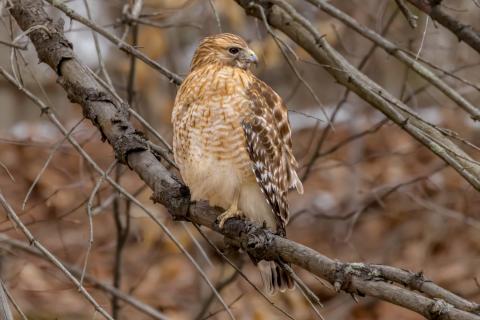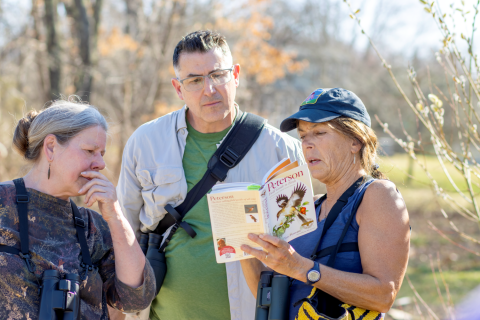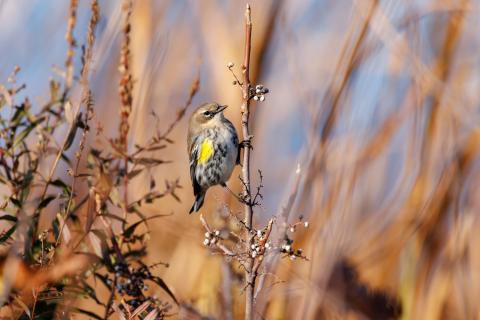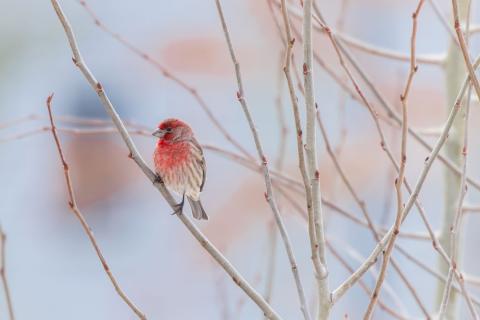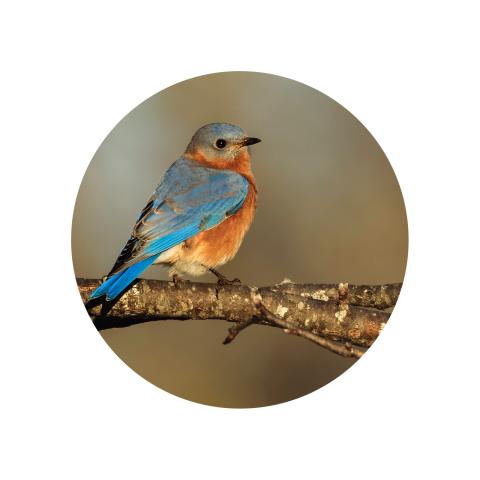Bird is the Word
Over 300 species of birds can regularly be found in New Hampshire, which makes learning how to identify them by sight and sound a challenge. Even experienced birders can always improve their identification skills. To help Granite Staters sharpen their birding knowledge, Extension state specialist for wildlife Matt Tarr ’96, ’99G, ’17Ph.D. created a twelve-week course called Introduction to Bird Identification, Ecology and Habitats.
Tarr first offered an online-only version of the course in 2020. Since then, he has offered the full course with online and field trip components. In 2023, 250 students participated in the course, which is available to beginners and experienced birders alike beginning in April and running through June. Each year, the course quickly fills with a long waitlist, proving the demand for this type of educational opportunity. “Our students are private landowners, members of community conservation organizations and land trusts, professional foresters, wetland scientists and the general public,” says Tarr.
Through a combination of weekly self-guided online lessons and optional field trips, participants gain understanding of the most effective methods for identifying fifty bird species commonly encountered in New Hampshire. Each weekly lesson provides detailed instructions for how to identify two to six new bird species by sight and sound, their habitat needs and the basic ecology of each  species. Weekly online quizzes help participants practice their identification skills and determine where additional practice is most helpful through a combination of audio recordings, photos and videos.
species. Weekly online quizzes help participants practice their identification skills and determine where additional practice is most helpful through a combination of audio recordings, photos and videos.
Course field trips not only teach students how to find, observe and identify birds by sound and sight (i.e., size, shape, plumage color patterns), they also include instructions on how to recognize different habitat types and habitat components that birds require, education on bird ecology and behavior and information about how landowners can encourage and conserve bird species in and around their property.
“Through partnerships with private landowners, communities and natural resources organizations, we’ve identified some of the best birding areas in different parts of the state where students can return on their own to bird and enjoy the outdoors,” says Tarr.
In 2023, over 80 field trips were offered across all ten of New Hampshire’s counties, providing many opportunities for students to get outside and learn. Many students participated in one trip each week; 205 students registered to participate in at least one field trip.
The course offers a range of field trips to accommodate the needs of a variety of students — some of the trips are led through brush and off-trail to observe birds; some are on paved and level paths or ADA accessible trails; and some trips are stationary where students can sit in one place to observe birds while receiving guidance from an instructor. Guest field trip instructors include Harris Center for Conservation Education bird conservation director and land specialist Phil Brown and Moosewood Ecological, LLC ecologist Steven Lemonde.
Overall, this course provides an exciting opportunity for Granite Staters to get outside with fellow birders and experts who can help participants improve their skills. “Learning how to identify birds is both fun and challenging, and there is always something to learn if we are willing to slow down and observe the nature that is all around us,” says Tarr.
This course will be offered again in 2024. It is co-sponsored by Harris Center for Conservation Education, Southeast Land Trust of New Hampshire, New Hampshire Fish & Game Department, New Hampshire Division of Forests and Lands and NH Timberland Owner’s Association.
Interested in hearing about future courses? Email Matt Tarr at matt.tarr@unh.edu.

